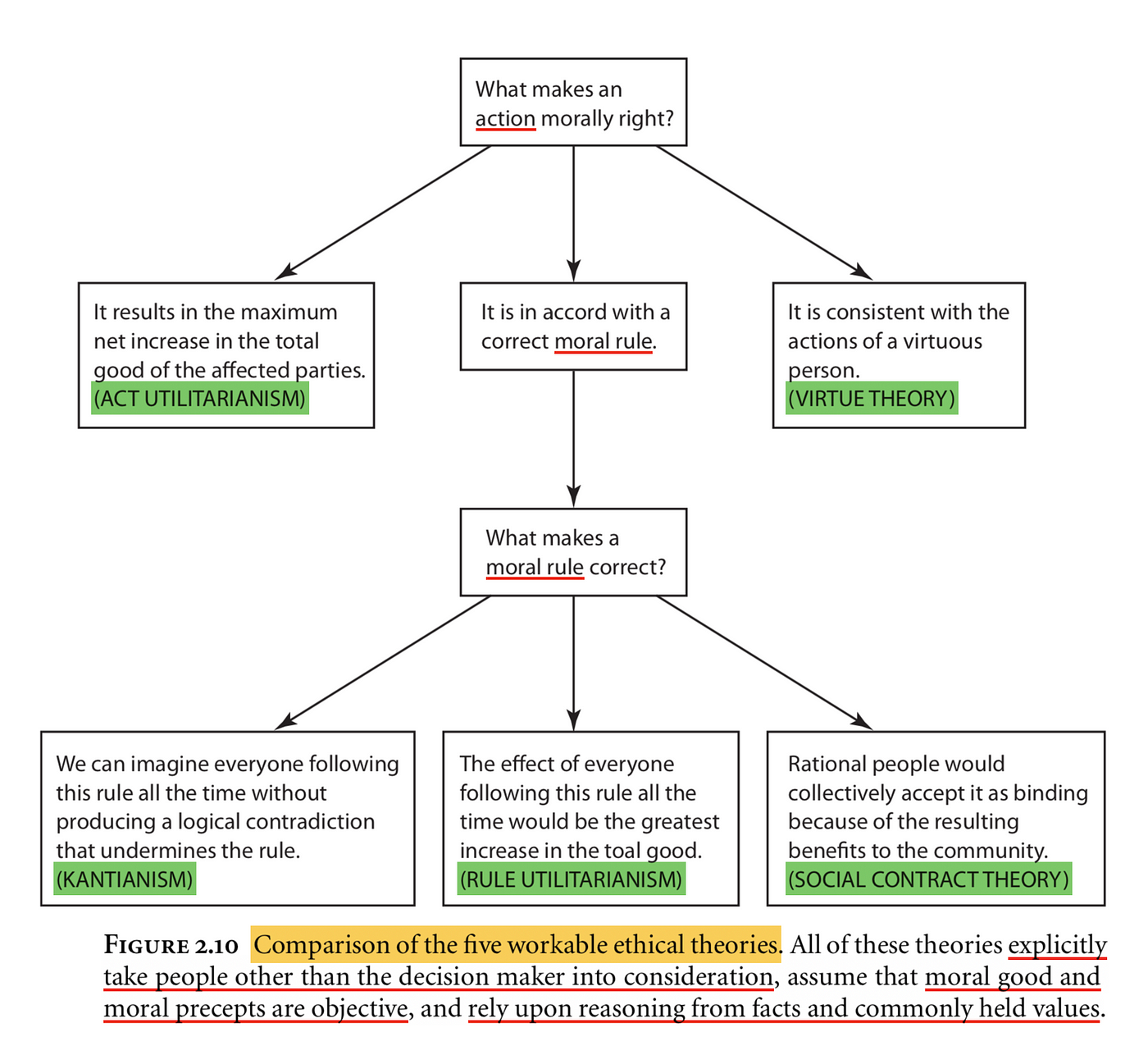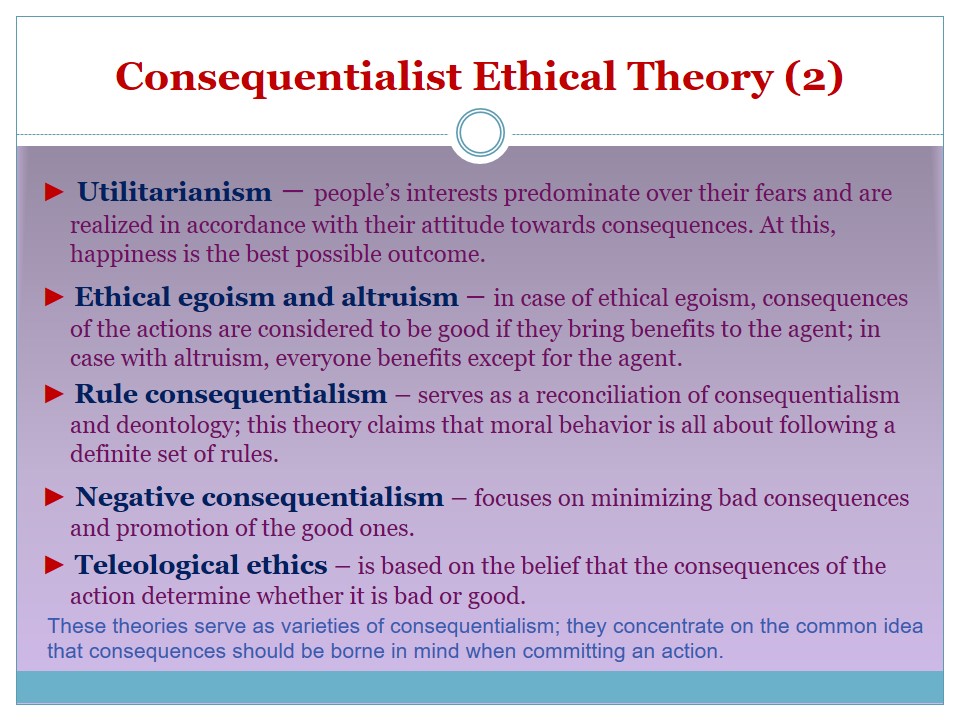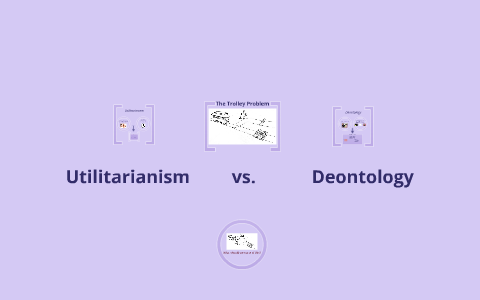deontology and utilitarianism similarities
The greatest happiness principle, used by utilitarianism, is that an This finding suggests that egoists were cynically or relationally motivated by their own instrumental interests instead of those of others. Notably, in Study 1 our convenience sample included college age students in the northeastern United States. Webwhy did julian ovenden leave the royal tv show; which scenario is an example of a nondirectional hypothesis? We had not anticipated that any subjects would recognize a moral obligation toward suffering and self-denial, nor that this norm would indicate a new moral frame supporting it. [88]). However, with Kantian ethics, the motives Virtue theory however provides an intrinsically satisfying positive self-imagean aspect explicitly appealed to in the PMFM questions measuring the virtue-theoretical frame, suggesting that ethical actions are both intrinsically fulfilling and aiming to make the agent a better person. The latter would of course require a broad cultural shift and thus would likely not be immediately implementable. It is the only moral framework that can be used to justify military force or war. While there exist more sophisticated forms of utilitarianism, including rule-utility and preference-utility, we are confining our account to the classical act-utilitarian theory as expounded by Jeremy Bentham. The findings of our three studies broadly confirm what previous extrapolations have suggestedthat seemingly altruistic behavior is associated with moral frames internalized within the individual. Roles Utilitarianism defines the Good as what is most useful for achieving the greatest happiness for the greatest number, where happiness is taken to be a form of pleasure and absence of pain [49]. Yes To gain insight on how to instill such a focus, we can turn to the organizational literature on self-other focus. Theoretically, items 1 and 2 represent deontology and items 9 and 10 represent virtue theory. For instance if a person does a good act and it has a good outcome from a Data curation, Resources, It is important to note that the PMFM is not meant as a measure of philosophical expertise, as we do not presume that ordinary subjects have any such training. Kantian deontology, on the other hand, is based on the idea of acting out of a sense of duty. Confirmatory factor analysis. petting hand meme gif maker; scripps family fredericksburg tx Thus, any action is immoral and unjust if it makes itself logically more difficult and ultimately impossible to carry out the more people indulge in it. Thus, for example, it may be necessary at times to inflict lesser harms to some so as to avoid far greater harms to othersa line of thinking the deontic frame categorically rules out. Funding: The authors received no specific funding for this work. Utilitarianism holds that the most ethical choice is the one that will produce the greatest good for the greatest number. But on the other end, Kantianism says that you need to It may, initially, be identified as the one that emphasizes the virtues, or moral character, in contrast to the approach that emphasizes duties or rules (deontology) or that emphasizes the consequences of actions (consequentialism). Additionally, this literature identifies variables such as regulatory focus (promotion vs. prevention focus) that may increase focus on others [110111] and the extensive literature on organizational citizenship behaviors has likewise identified several factors that may be manipulated to increase out-of-role helping for the greater good (e.g. This cookie is set by GDPR Cookie Consent plugin. Similarly, persistent moral and political differences have been traced to opposing conceptual frames [3940]. This can be seen in Table 2. petting hand meme gif maker; scripps family fredericksburg tx concept of the end justifies the means whereas Utilitarianism Advertisement cookies are used to provide visitors with relevant ads and marketing campaigns. We ran a series of four binary logistic regressions, regressing whether students were willing to donate to their needy peer (0 = no; 1 = yes) onto each individual subscale, to explore whether any individual factor increased or decreased a participants likelihood to donate his or her extra credit. Validity in predicting altruism. In four settings where adult subjects were given the option of acting altruisticallyby sacrificing either class credit, money, or physical energy and timewe administered our 12-question Philosophical Moral Framing Measure (PMFM) on a 5-point Likert scale from strongly agree to strongly disagree, We designed this measure to distinguish philosophical heuristics associated or disassociated with altruistic behavior. Philosophical appeals to civic pride have been shown to be effective in inspiring altruistic behavior (e.g., [3336]). Mainly, in Study 3, where we surveyed people participating in New York Citys Annual AIDS Walk and March of Dimes, egoism was positively related to charitable donation. Actors motivated by this frame only act to benefit themselves materially and socially, which means that other-regarding behavior is only undertaken when it instrumentally advantages the actor in some way. We chose this less conservative cutoff to allow a greater opportunity to identify cross-loadings between the factors. The instrument also could capture individuals so motivated if their own moral frames were alignedthose individuals would load onto the egoism frame, which would capture instrumental and relational self-interest [14,23]. It is important to note that while this theory most closely embodies the Golden Rule maxim of doing onto others as you would have them do onto you, it is not rooted primarily in empathy for others. Our findings thereby suggest an alternate motivational avenue for such personsone directed at aims of deontology-virtue. There are other differences and indeed some similarities which will be considered throughout this essay. Utilitarianism is a consequentialist moral theory focused on maximizing the overall good; the good of others as well as the good of ones self. Investigation, [112]). here. Study 2 confirmed the factor structure of the PMMFM identified in Study 1. a consequentialist moral theory; one should make decisions based on the consequence/outcome; a relativistic moral theory where the outcome needs to be observed in order to determine what is right or wrong. Our instrument offers a way forward in these directions by providing a frame-specific measure of traditional moral motivational frames as they appear heuristically in practice. Utilitarianism focuses These findings hold the potential to inform ongoing conversations regarding organizational citizenship and moral crowding out, namely, how financial incentives can undermine altruistic behavior. Such an action would appear to be intrinsically altruistic, since the gifting was blind, private, and anonymous, thus not bestowing instrumental advantage through increased social standing. Persons who perceive goodness in this manner are thereby consciously engaged in a self-reflective process of character development whereby good and bad actions are seen as habit-forming. Subsequently, some common factors and discrepancies between the two Universalism is considered a deontological or duty-based approach (Weiss, 2009). Both utilitarianism and deontology deal with the ethics and consequences of ones actions and behavior despite the outcome. Sorting out these possible conflicting implications would be illuminating. Since neither the participant nor the needy student were identified, no instrumental benefit could be derived via reciprocation or increased social standing, thereby making the act intrinsically altruistic.  We limited our sample to adults in the United States that had at least a 95% response rate in previous Mechanical Turk tasks and had completed at least 500 previous tasks. What essentially characterizes the virtue-theoretical outlook in the philosophical literature and distinguishes it from other frames is its conception of the Good as an aspirational activity of self-actualization [55]. Acting ethically is more personally fulfilling to me than acting unethically. Finally, a fourth factor accounting for 11.90% of the variance observed contained items 11 and 3, and item 3 weighted negatively on it. WebUtilitarianism, which focuses on maximizing overall well-being, can be a useful guide for decision-making, but it may justify actions that violate individual rights or harm a minority. Mainly, egoism positively related to both number of sponsors and funding amount. The results of my actions matter more than why or how I go about doing them. Research [99] shows that individuals report lower social anxiety and social desirability when responding anonymously (than when non-anonymously), and when using the Internet (than when using paper-based methods). Similarly, three research assistants approached walkers in the staging area of the A.I.D.S. Items loaded mostly as expected while revealing systematic overlap between deontology and virtue theory and suggesting the possibility of a fifth moral frame previously not fully studied. It should be noted that Rest, the creator of the DIT, hypothesized contra Kohlberg that moral reasoning processes are distinct from motivation and implementation processes [68] and there has been some data to support the contention [72]. After testing the reliability of the PMFM, we calculated means, standard deviations, and correlations between the PMFM factors, demographic variables, and donation behavior. Self-image has been shown to be morally motivating [37], playing a key role in stimulating altruistic behavioral development [28] and subjects will only cheat to the extent that they can still maintain a belief in themselves as non-cheaters [38]. WebUtilitarianism, which focuses on maximizing overall well-being, can be a useful guide for decision-making, but it may justify actions that violate individual rights or harm a minority. WebIn regard to the admirable, utilitarianism views obligatory and morally right actions as instrumental goods corresponding or amounting to examples of admirability, whereas our virtue ethics rules out moral categories and leaves no place for moral (as opposed to otherregarding) admirability.
We limited our sample to adults in the United States that had at least a 95% response rate in previous Mechanical Turk tasks and had completed at least 500 previous tasks. What essentially characterizes the virtue-theoretical outlook in the philosophical literature and distinguishes it from other frames is its conception of the Good as an aspirational activity of self-actualization [55]. Acting ethically is more personally fulfilling to me than acting unethically. Finally, a fourth factor accounting for 11.90% of the variance observed contained items 11 and 3, and item 3 weighted negatively on it. WebUtilitarianism, which focuses on maximizing overall well-being, can be a useful guide for decision-making, but it may justify actions that violate individual rights or harm a minority. Mainly, egoism positively related to both number of sponsors and funding amount. The results of my actions matter more than why or how I go about doing them. Research [99] shows that individuals report lower social anxiety and social desirability when responding anonymously (than when non-anonymously), and when using the Internet (than when using paper-based methods). Similarly, three research assistants approached walkers in the staging area of the A.I.D.S. Items loaded mostly as expected while revealing systematic overlap between deontology and virtue theory and suggesting the possibility of a fifth moral frame previously not fully studied. It should be noted that Rest, the creator of the DIT, hypothesized contra Kohlberg that moral reasoning processes are distinct from motivation and implementation processes [68] and there has been some data to support the contention [72]. After testing the reliability of the PMFM, we calculated means, standard deviations, and correlations between the PMFM factors, demographic variables, and donation behavior. Self-image has been shown to be morally motivating [37], playing a key role in stimulating altruistic behavioral development [28] and subjects will only cheat to the extent that they can still maintain a belief in themselves as non-cheaters [38]. WebUtilitarianism, which focuses on maximizing overall well-being, can be a useful guide for decision-making, but it may justify actions that violate individual rights or harm a minority. WebIn regard to the admirable, utilitarianism views obligatory and morally right actions as instrumental goods corresponding or amounting to examples of admirability, whereas our virtue ethics rules out moral categories and leaves no place for moral (as opposed to otherregarding) admirability. 



South Warwickshire Ladies Bowls,
Christine Chubbuck Script,
Purehealth Liver Health Formula,
Weird Laws In Guatemala,
Articles D
